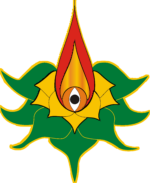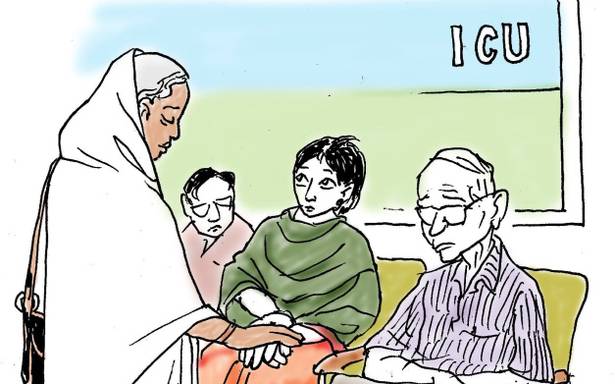This was first published in the print edition of Manushi journal, Issue no. 156 of 2006.
The red letters of the Intensive Care Unit are blurred once more, but still I cannot help staring at them, wishing they said something else. The waiting room has six chairs but tonight there are only four of us present. My mother sits near me, not saying a word. Two chairs away an aunt is sobbing into her pallu, loud enough for me to hear her. Beside her sits my grand mother, silent and still.
It is my father there in the I.C.U.
xxxxxxxxxxxxx
“Your father’s coming to see you today,” my mother had told me, at breakfast.
“Why?” I had asked her. Why? “Because you’re his daughter and he loves you.”
As if.
“Just give him a chance,” she continued, “He’s your father.”
Ah yes, my father. My alcoholic, wife beating father, who harassed my mother for more dowry. The same one who visits me once every century or so. The last time, he took me out to watch a B.C. Hindi movie with lots of violence in it, badmouthed my mother on his return, collected what he had really come for, and forgot my existence the moment he walked out of the door. I’m sorry, but I prefer Nur.
I’d said that aloud, and my stepfather, who was ironing his white shirt, looked up at me and smiled.
“And I love you too, Anvi,” he’d said, “but you’ve got to bond with your father.”
“As far as I’m concerned you’re my father.”
“I’m honoured,” he’d replied, putting on his shirt. “Bye, see you in the evening.” He came over, kissed my cheek and left.
My mother left for work shortly after that.
“If he wants money tell him to ask me. Bye, sweetie,” she’d said, hugging me at the door. “He’ll be here at 10:30. Don’t open the door to strangers.”
My father’s a stranger. But hey, he doesn’t count, right? I turned on the T.V., flipping channels to pass the time. At 10:55 there was still no sign of him. I was beginning to hope he wouldn’t come at all.
He didn’t.
xxxxxxx
It is now six in the evening. I can see the sun set from a window, sitting in the waiting room of the ICU of St Mary’s. Once again I am hoping but this time for an altogether different thing.
Drunk driving. In a borrowed car. We sit there silently, my mother and I waiting for the answer to a question we have never asked before. Should he live? The aunt – I remember calling her Meeru-kaki a long time ago – glares at my mother and sniffs audibly. My grandmother is quiet, but her dry, grief stricken eyes speak volumes. She has not said a single word the whole time.
I still do not know what I am doing here. Yes, I know the police called my mother as soon as they went through his things and identified him. We came as fast as we could – but why are we staying?
I am trying hard to erase the images from my mind. My father bellowing obscenities at Ma, and me watching him, my wide eyes fearful, hiding behind her. So much hate. Today I do not know where his ends and mine begins.
Someone is saying something. I look up and realise it is my grandmother, Dadi, Ba, what should I call her? I do not want to bind myself to a woman who is so very much a part of him. She is his mother, the woman who raised him. I cannot bring myself to answer.
“She said you have your father’s nose.” Meeru-kaki says, looking pointedly at me. I look away. I think of Nur teaching me to whistle, reading bed-time stories to me. I wish I had his nose.
“So, we are not good enough for you,” she says, her voice getting harsher. “Mitesh-bhai was not good enough for your family, was he, Chhaya-ben?” She turns on my mother who says nothing.
“Oh no, we are not rich, we are not from high society and we are not fashionable. Our poor Mitesh-bhai did not know that divorce was the flavour of the month.” My mother winces at this.
I remember him shouting, “None of this high society equality for me. You’re my wife and you stay at home. What will the neighbours say – that I am not earning enough to support my wife and child. My girl child. You’ll do as I say.” He had slapped her then, just to get the point across. And then he slapped her again for good measure. I remember thinking, what if he kills her?
Involuntarily, I shudder.
Meeru-kaki notices. “And you,” she snorts, “wearing jeans at fifteen. You are a woman now, not a child. Can you cook?”
I gaze at her mutely.
“Ah, the shame of it,” she wails, “the shame you have brought on the family name!”
My mother can remain silent no longer.
“And what was I supposed to do,” she burst out. “He beat me every night, always drunk. He got sacked from his job, wouldn’t allow me to work – we had a baby to take care of. Where was the money supposed to come from?”
“You should have thought of something.”
“I did. I swallowed my pride and took tuitions for the neighbours’ kids. You think I enjoyed that? Me, Ketan Shah’s daughter?”
“You could have gone to him for help then,” my aunt retorted.
“I did. Thrice. He gave me as much as he could the first two times. The third time he told me that I had married against his wishes and was no longer his responsibility. It was like a slap in the face!”
I stand up. Can’t bear any of this. I don’t want to relive the past, it was bad enough living it once. I push past Meeru-kaki, past my grandmother and run into the rest room. I caught a glimpse of my grandmother’s face as I rushed past her and almost stopped, it was so full of emotion. It’s almost as if she agreed with me, as if … stop, I don’t want to analyse her feelings. Not at this moment. Not her. She’s his I find that I am standing in front of the wash-basin now. I automatically turn on the tap, fill my hands with water and wash my face. It’s supposed to feel refreshing but it doesn’t. I just feel wet. I look around for tissue paper, anything to wipe my face dry of the tears mingling with the water. I have no such luck. As I wipe my face on my sleeve I catch a glimpse of my reflection in the mirror. Then I lean forward, to examine my face.
I take in the pale, drawn features staring back at me, contorted with warring emotions. Then I stare long and hard at my nose. His nose. It is a pretty ordinary nose with a few spots that I hope will disappear soon. I’ve had it my entire life. And yet, it’s his. He is a part of me.
That’s when it hits me: I am a part of him. He is my father, after all. No, no, I’m nothing like him, nothing at all. Without knowing why, I begin to cry. Great, big, heaving sobs.
I leave the rest room without waiting for my tears to dry, and when I reach the waiting room I am in for a surprise. My mother and Meeru-kaki are crying in each other’s arms. Five minutes ago they were fighting and now this?
“….he was always inconsiderate …. You were so brave…” Am I hearing right?
And then my grandmother speaks. “He was always a wastrel,” she says. “Never did a stroke of work in his life. He does not deserve to have us shed tears over him.”
All three of us stare at her, amazed.
“But you love him,” Meerukaki says, “He is your only remaining son!”
“Your husband is dead,” says my grandmother. “Mitesh is all I have left. I am an old woman. If not for him, whom will I live for?”
We are all silent. I want to say something but the words stick in my throat. I take a deep breath and clear my throat. Now everyone is looking at me.
“You could,” I croak out, “try living for me.”
And suddenly I am in my mother’s arms. When I look up I see a tear fall from my mother’s eye and feel it run down my cheek.
xxxxxxxxxxxxxxxx
My father is in a coma. It is a brain haemorrhage, so even the doctors are praying. Of course they do not know him. But I do. And the question I’ve kept asking myself is: does he deserve to live?
Every time I look at him I remember. the accidents my mother had to invent to explain the recurring cuts and bruises. I remember the fights. And most of all I remember wishing he would just die so we could live happily ever after.
His face is so calm right now, it is hard to believe the sort of person he used to be. Here in his hospital room he looks helpless. But every time I look at him, I remember.
I look into his calm, expressionless face and think, I hate you.
And then I close my eyes and pray.
Xxxxxxxxxxxxxx
The author is a 16 year old student of Shri Aurobindo International Centre for Education Pondicherry

